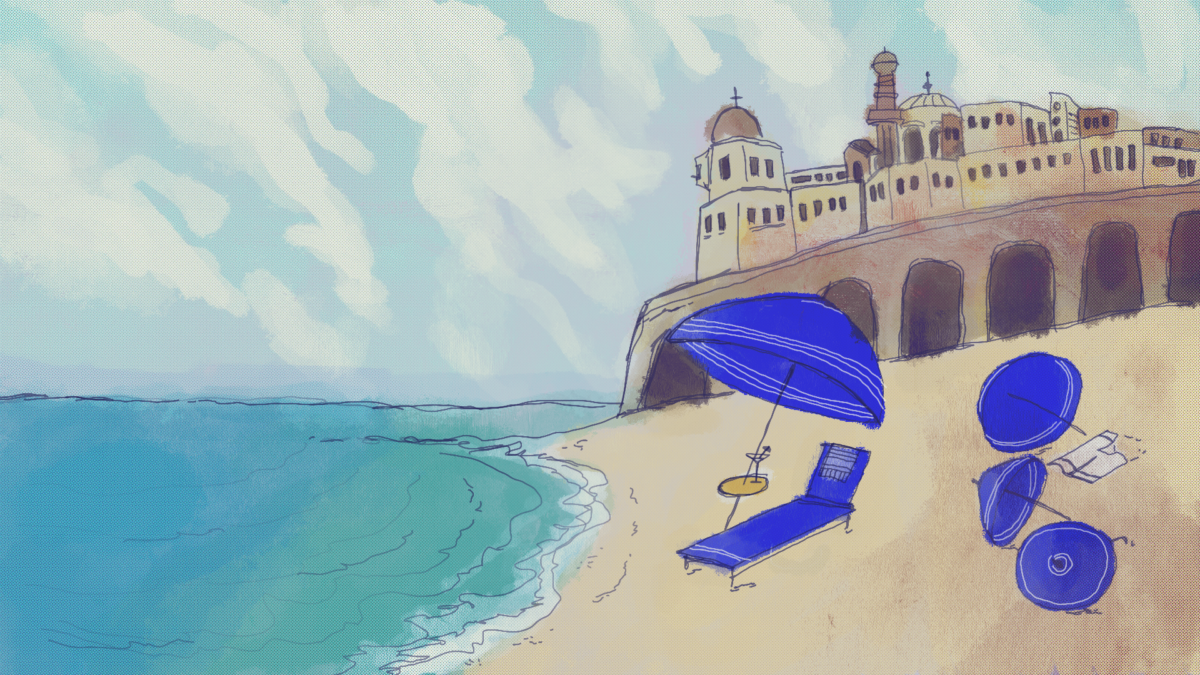The sand absorbed heat throughout the day and released it after the temperature dropped. She could feel it on the back of her legs when she stretched out on her towel.
You should go swimming, he said. He stood in front of her, looking down, his sunburnt arms slack by his side.
I didn’t realise you were standing there, she said. He shrugged, his wet hair flicking droplets onto her towel. She shut her eyes and shook her head.
You’re missing out, he insisted. She shook her head again. She already knew how the water felt. She heard him sigh quietly, still standing there, and twisted to look at him properly, suddenly uncomfortable at the thought of him watching without watching back, but he wasn’t looking at her anymore — a pack of teenagers had arrived carrying beer and a speaker pumping bassy music with German lyrics. They were clambering over the rocks that jutted out over the water at the beach’s far end. Reaching the top, one of them gave an indistinct yell and enthusiastically threw herself from the rock into the water beneath, to general approval and laughter. She emerged, flicking her short hair back in an arc, and swam confidently back to her friends.
He looked back down at her, eyebrows raised, like their observation proved a point, then turned away again, walking back towards the water. He didn’t slow down until it was past his waist. Then he started to swim, the skin on his back glinting in the sun.
Reckless, she thought. And he was a bad driver too; the more time they spent together, the clearer it became what things would look like if they kept this on. He’d nearly gotten them killed on the way here. A truck had swept past them while he’d been going faster than he should have been on the windy road, and their rental car had been pushed to the edge so that two wheels skidded on the narrow gravel shoulder. She braced one hand on the car door and one on the dashboard as the car tilted. Off the road was a sheer drop; she could see the beaches below them, the waves frozen like she was watching them from an aeroplane, the sharp green slope running from the edge of the road right down to where it met the sand hundreds of meters below. It would have been so easy for the car to slip just a little further, and then they would have been sent skidding over the edge, and her vision would be filled with flashes of sky and grass and crunching metal or, quickly, with nothing at all. For a moment, she wanted to reach across the centre console to grab his shoulder or to touch his free hand, but he’d brought it up around the wheel too, his knuckles taut with effort, and the car righted itself and continued up the hill.
He’d turned to look at her, apologetic, but the shock was still too fresh for her to get properly angry. They’d let out a shared exhale of laughter, the sound displaced, relieved more than amused, like the awkward chuckles that had passed through the small cinema they’d sat in the previous evening as the credits descended on Mulholland Drive. Instead, she’d told him to put on the radio, and he had. The knob was sticky with sand or rust, and he struggled with it for a moment, swearing. She kept her eyes on the road for him. The sound, when he got it to focus — two men speaking in rapid Italian — faded in and out as they wound around the hill, and the signal worsened.
Tomorrow, they would drive back to the train station. Next time, he would say. I had fun. Until next summer, if you’d like. She would nod, and then he would walk away from her, his body quickly becoming strange and anonymous amongst the rush. She would buy a lousy coffee and sit by herself for an hour before a different train came to take her away in the opposite direction.
In a week, her hair would smell like cafeteria grease and detergent. For now, it was dried out from the salt water and sun and smelled like the little plastic bottles of shampoo from the motel. She hadn’t really gone swimming, had only waded in to waist depth and then laid back and floated on the surface, waiting, letting her hair fan out around her. She wasn’t a swimmer. She wound her fingers through the strands, then let her hand fall to her side.
The teenagers were getting louder. One of them had turned up the music on the speaker, and the sound throbbed across the water, the sound staticky and indistinct. She wanted to go up to them and ask them to turn it down. She wanted to ask them if she could have a go at dive bombing from the rocks.
He was nearly at the other end of the beach now, close enough to the teenagers for their speaker to overpower the sound of his limbs slapping against the water. The light had started to soften; they would only have a few more hours before it faded completely. He turned around, treading water. He waved at her. She waved back. He yelled something that she couldn’t hear. She shook her head and laid back. They still had the rest of the afternoon and the next morning. Almost a full day. She dug her fingers into the hot sand and squinted into the sun.
We acknowledge the Ngunnawal and Ngambri people, who are the Traditional Custodians of the land on which Woroni, Woroni Radio and Woroni TV are created, edited, published, printed and distributed. We pay our respects to Elders past and present. We acknowledge that the name Woroni was taken from the Wadi Wadi Nation without permission, and we are striving to do better for future reconciliation.
